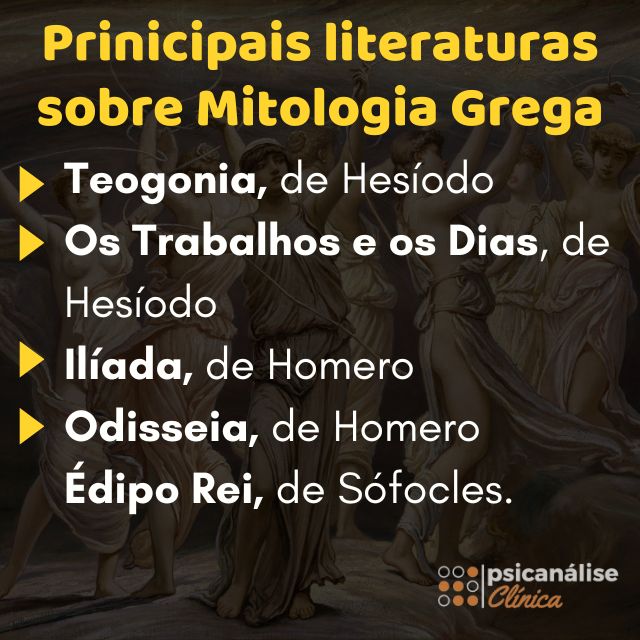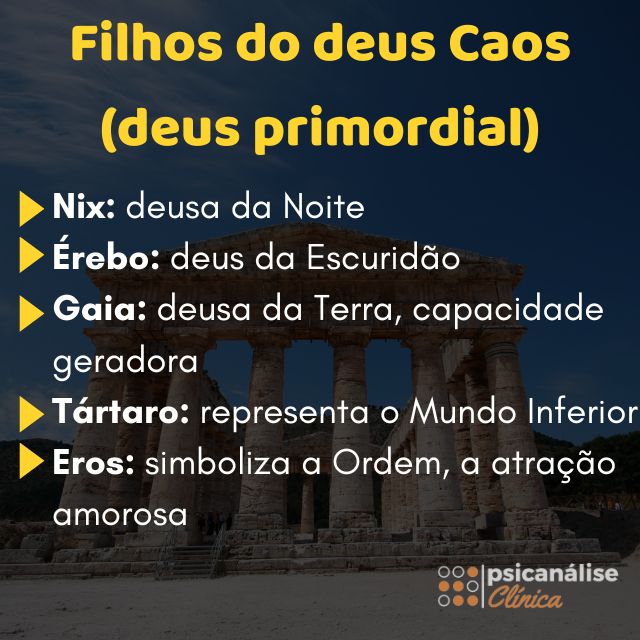Table of contents
Greek mythology is full of explanations about the origin of life and the phenomena of nature, told through stories with gods and heroes. And among the main myths is that of Chaos, primordial Greek god, that is, he is among the gods described as creators of the universe .
In short, Chaos can be understood as the symbol of the entire Cosmos, characterized as the personification of an undefined matter, under which the universe and all living beings would emerge.
For Hesiod, a Greek poet who lived from 750 to 650 B.C., the Greek god Chaos is the oldest of all the gods and titans described in Greek mythology.
Greek Mythology
Greek mythology is, basically, the study of Greek myths and their meanings, relating them to the understanding of the origin of things and of society. That is, for many, understanding Greek myths is paramount to understanding society and its behavior. After all, the greek mythology brings theories about the origin of the world This is the way of life, demonstrated through mythological beings, such as gods and heroes.
These myths, in the course of time, were expressed through Greek literature and also through other arts, such as paintings and ceramic works:
- Theogony, by Hesiod;
- The Labors and the Days, by Hesiod;
- Homer's Iliad;
- Homer's Odyssey;
- Oedipus the King, by Sophocles.
Greek mythology has a great cultural influence on Western civilization, where poets even today use it as a source of inspiration. Moreover, mythological beings are still used to explain the contemporary world, as well as influencing science, such as the names given to the planets in the Solar System.

Who was Chaos in mythology?
Chaos, from the Greek Χάος according to Hesiod, is the primordial god in Greek mythology, the one who gave birth to the universe. His name is derived from the Greek kháos (χάος), which means emptiness, abyss, immensity, which, then, refers to the primordial void.
The nature of this god, over time, has become complex, due to the various theories that have emerged. At first, Chaos was understood as the air that filled space, later, it came to be understood as the primordial matter for the creation of all elements in the universe .
In general, Chaos is understood as the most ancient force, through which all the elements of nature manifest, creating the universe. From Chaos, Nix (Night) and Erebo (Darkness), and other important deities were born.
As an example of the of the elements and entities created, from the union of his sons Nix and Erebo, the Moiras were created, which, in short, are three controlling deities of fate, the Goddesses of Destiny, and they are:
See_also: Psychoanalyst Wilfred Bion: Biography and Theory- Cloto: who wove the thread of life, figuring as the goddess of births and births;
- Lachesis: determined what would happen in each person's life. By symbolism, she was the one pulling and winding the thread of the cloth, which represents the unfolding of life;
- Atropos: was the goddess who cut the thread of life, that is, she was the one who decided how each person would die.
Even Zeus, the god of all gods, feared the Moiras, for not even he could interfere with fate, because any change in fate could interfere with the entire universe.
How was the Chaos god born?
Among the main theory about how Chaos was born, is that it simply always existed In other words, he is at the beginning of everything, at the origin of everything, and from him, other elements and divinities emerged. Then, right after him, Gaia, Tartars and Eros emerged.
However, as an example of other theories about the birth of Chaos, is that of Pherecides of Siros (6th century), who maintained that Zeus, Chronus and Gaia had always existed, i.e., that no "creation" had occurred.
See_also: Erich Fromm: life, work and ideas of the psychoanalystChaos God and the origin of the Universe
For Hesiod, Chaos is considered to be the first god that appeared in the universe, that is, the oldest among all the other gods in Greek mythology, also known as the primordial god.
So, for this theory, as a primordial god, Chaos had the ability to spontaneously generate other great creatures and gods. Thus, the main sons of Chaos were:
I want information to enroll in the Psychoanalysis Course .
Read Also: The Corpse Bride: A Psychoanalyst's Interpretation of the Film
Sons of Chaos
- Nix: goddess of the Night;
- Erebo: god of Darkness;
- Gaia: goddess of the Earth, personifying her generative capacity
- Tartarus: represents the Underworld;
- Eros: symbolizes the Order, the amorous attraction.
Above all, the period during which Chaos existed alone is not explained for certain, and there is no chronological relationship between his descendants. However, what is important is that, through these deities, the reality of living beings came about.

Curiosities and theories about Chaos in mythology
Hesiod also demonstrated Chaos as a habitable place, similar to the myth of Tartars-an ancient deity who served as a prison for titans. He explained Chaos as a dark place, which lay between the earth and even among Tartars himself.
Some theories, furthermore, say that Chaos, during the Titanomachy, when Zeus threw lightning bolts at the titans, Chaos became intensely hot, while in other tales, it is shown that everything started only from emptiness and darkness, that this would be Chaos itself.
In any case, the Chaos stories have one thing in common, when it comes to origin of the name, which means to separate, to be empty, broad, immensity Thus, associating the concept of disorder in several senses, to the origin of the Cosmos or of human life.
Moreover, despite the changes in the versions of the primordial god, the mythology about his existence serves, even today, as lessons for human beings. For, in any case, Chaos represented disorder and his son, Eros, order, together symbolizing balance. In other words, it shows men the importance of maintaining a balance between order and disorder.
Why study Greek mythology?
However, studying Greek mythology brings us reflections about life, especially how humanity behaves. The myth of the god Chaos is one of the main examples, which makes us reflect about the origin of the universe and all the phenomena of nature.
However, if you have reached the end of this article about the god Chaos You probably like to learn about the history of the development of society, which, through Greek mythology, is demonstrated through metaphors, which talk about emotions, feelings, behavior, among others.
This is why it is worth your while to take our Training Course in Clinical Psychoanalysis. With this study, you will understand how human behavior occurs, under the psychoanalytical view. Among the main benefits of this study is the enhancement of self-knowledge and improvement in interpersonal relationships. Because the experience of psychoanalysis is able to provide the student and the patient/client with visionsMoreover, understanding how the mind works can lead to better relationships with family and work members. The course is a tool that helps the student to understand other people's thoughts, feelings, emotions, pains, desires, and motivations.
Finally, if you enjoyed this article, please like and share it on your social networks. This will encourage us to continue producing excellent content for our readers.
